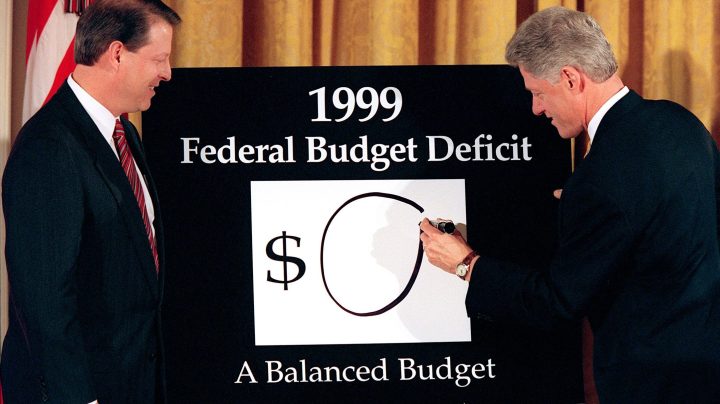
What would it take to balance the federal budget?

To balance the federal budget, government revenue must meet or exceed government spending. That’s happened only twice in the past half-century: President Lyndon Johnson did it in 1969, and President Bill Clinton from 1998 to 2001.
These days, the federal budget is far from balanced. The federal government has spent $421 billion more than it has collected in fiscal year 2023. Higher interest rates make paying off that debt even more challenging.
Despite that, balancing the federal budget within the next decade is a key Republican talking point.
Linda Bilmes, a senior lecturer at the Harvard Kennedy School, was in the Clinton administration the last time the budget was balanced. She joined Marketplace’s Kai Ryssdal to talk about what it would take to find a balance with today’s budget. An edited transcript of their conversation is below.
Kai Ryssdal: So President Clinton walks into the room or whatever meeting you happen to be in, and says, “Hey, bring me a balanced budget.” Then what happened?
Linda Bilmes: Well, then what happened is he realized that this was going to be pretty difficult. We had a 5% GDP [gross domestic product] deficit when he took office. But Clinton had the courage to raise taxes and to cut military spending. And he also had the good luck to be president during a benign economic period when we had a tech boom and a peace dividend.
Ryssdal: Yeah. So it seems, actually, the timing for President Clinton was everything as far as it went on being able to deliver on his promise of a balanced budget.
Bilmes: Well, timing was important, but it was not everything. It was Clinton’s taxing and spending policies in his first term that laid the table for the budget surplus. But in the second term, when the Republicans gained the House, he and Speaker [Newt] Gingrich were able to negotiate, which kind of kept some of his controversial but essential tax increases and budget cuts. And Speaker Gingrich had the authority and the majority to be able to deliver Republicans to negotiate a deal.
Ryssdal: And as we know, Speaker [Kevin] McCarthy’s hold on power is much narrower than Speaker Gingrich’s was back then. Let me ask you about the kind of spending the government did back then, specifically, the spending on Social Security and Medicare and the social safety net programs, and the chunk of the federal budget they took up then versus now.
Bilmes: Well, entitlements — including Social Security and Medicare, and so forth — they are almost two-thirds of the budget. And when we were in office during the Clinton administration, they were less than half. And we also have a much bigger national debt due to three large tax cuts during the Bush and Trump administrations, and 20 years of war, and vast spending on the 2008 financial crisis and the pandemic. So it really is a very different environment. And then of course, the political situation is different.
Ryssdal: This is kind of a baseline question, I suppose, but what are the arguments for a balanced budget other than not spending more than you take in?
Bilmes: I think there is no reason why a balanced budget is magic. What standard economics teaches us is that during boom times, we should try and pay down debt. And during difficult or fragile times, we should spend more to try and take care of our population. And so over the long term, we should be, roughly speaking, in balance. It should be ebbing and flowing. But what’s happened is that, for a long period of time, we haven’t been ebbing and flowing; we have just been flowing.
Ryssdal: With the caveat that you have been out of government for a good, long while, do you think that it’s possible for the Republican Party and the House of Representatives to deliver, as they have promised, a balanced budget in 10 years?
Bilmes: A balanced budget is not an end in and of itself. But it is certainly possible. And the Congressional Budget Office has published dozens of recommendations on how to do it to close the gap between revenues and spending. And it is possible to do it responsibly, but that involves revenues, which means taxes, as well as spending cuts. And it also involves making some very unpalatable choices and tackling some of the third rails, including entitlements and the military budget. And it also involves being willing to be bipartisan and to come to the table in a way that everything is on the table.
Ryssdal: So it sort of sounds like you don’t think it can be done.
Bilmes: Well, what I fear is that we will resort to a series of budget gimmicks. It’s very easy, if you’re looking 10 years out, to make rosy assumptions. If we assume that GDP is going to grow 5% a year and that somehow spending is gonna go down over the next few years, we can imagine up a balanced budget in 10 years. But that’s not real. To get a real balanced budget, you need to have the courage to make hard choices and the wisdom to negotiate seriously — as well as economic luck.
There’s a lot happening in the world. Through it all, Marketplace is here for you.
You rely on Marketplace to break down the world’s events and tell you how it affects you in a fact-based, approachable way. We rely on your financial support to keep making that possible.
Your donation today powers the independent journalism that you rely on. For just $5/month, you can help sustain Marketplace so we can keep reporting on the things that matter to you.

















